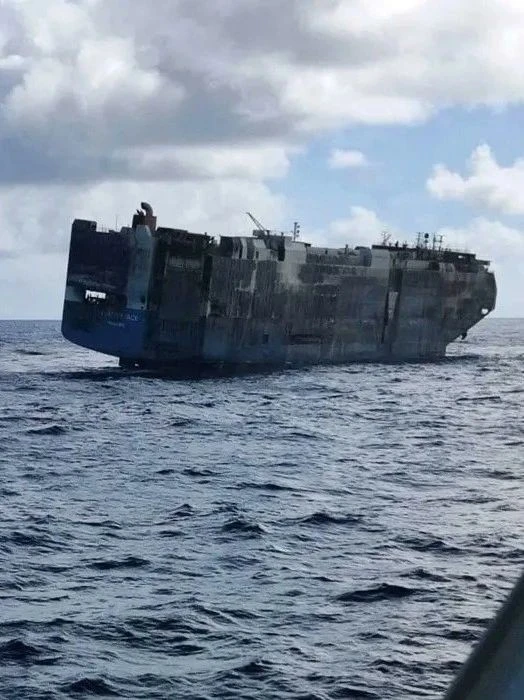Zodiac Maritime vessel carrying electric vehicles succumbs to structural damage following extended fire battle
 Breaking: Car Carrier Vessel Lost After Extended Fire Emergency
Breaking: Car Carrier Vessel Lost After Extended Fire EmergencyThe Morning Midas car carrier operated by international ship management company Zodiac Maritime has sunk in North Pacific international waters following a devastating fire that raged for nearly three weeks. The vessel finally lost buoyancy on June 23rd afternoon after severe structural damage, compounded by harsh weather conditions and seawater ingress.
May 26, 2025: Morning Midas departed Yantai Port, China, bound for Mexico with scheduled arrival June 15th
June 3, 2025: Fire erupted in deck area while vessel was positioned 300 miles southwest of Adak Island, Alaska
June 16, 2025: Rescue teams reported no visible flames remaining aboard the vessel
June 23, 2025: Morning Midas sinking confirmed after structural integrity compromise
All 22 crew members were successfully rescued by a nearby container ship when the fire first broke out, with no casualties reported. The swift rescue operation prevented what could have been a tragic loss of life in the remote North Pacific waters.
The lithium battery fire characteristics proved particularly challenging for firefighting operations. The unique properties of lithium-ion battery fires made the blaze extremely difficult to extinguish, with visible flames persisting for over ten days despite continuous firefighting efforts.
Key Fire Fighting Challenges:
While rescue teams successfully eliminated visible flames by June 16th, the extended fire had caused irreversible damage to the vessel's structural integrity. As the crew awaited the arrival of professional salvage tugboats, seawater ingress and compromised hull strength ultimately led to the vessel's loss of buoyancy.
The Morning Midas wreck now joins a growing list of car carriers lost to fire incidents involving electric vehicles and their lithium-ion battery systems.
This incident highlights escalating concerns about electric vehicle shipping safety in the maritime industry. The Morning Midas disaster represents the latest in a series of high-profile car carrier fires linked to lithium battery technology:
According to Allianz insurance reports, ship fires have increased by 20% over the past decade, with lithium battery transport emerging as the primary risk factor. The insurance industry has identified several contributing factors:
The Morning Midas car carrier loss sends shockwaves through the automotive shipping industry, particularly affecting:
Immediate Impacts:
Long-term Industry Changes:
The incident has prompted urgent reviews of maritime fire safety technology specifically designed for lithium battery emergencies. Industry experts are calling for:
The North Pacific vessel sinking raises both environmental and economic concerns:
Environmental Impact:
Economic Impact:
Maritime authorities and industry stakeholders are now accelerating efforts to address car carrier fire prevention. Expected developments include:
The Morning Midas tragedy serves as a critical wake-up call for the maritime industry as it adapts to the growing electric vehicle market. While the successful crew rescue prevented human casualties, the vessel loss highlights urgent needs for:
As the automotive industry continues its transition to electrification, the maritime sector must rapidly evolve its safety protocols and equipment to handle the unique challenges posed by lithium-ion battery transport.
The loss of Morning Midas marks a pivotal moment in maritime safety, emphasizing that technological advancement in automotive design must be matched by corresponding improvements in shipping safety measures.